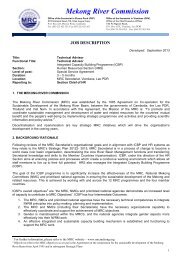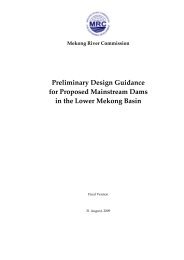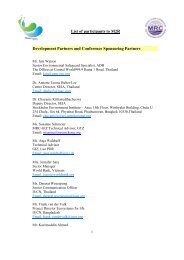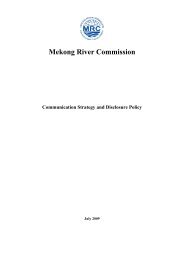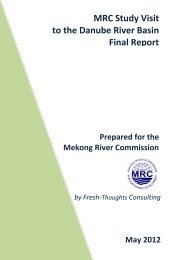Carriage, Handling and Storage of Dangerous Goods along
Carriage, Handling and Storage of Dangerous Goods along
Carriage, Handling and Storage of Dangerous Goods along
Create successful ePaper yourself
Turn your PDF publications into a flip-book with our unique Google optimized e-Paper software.
64 RECOMMENDATIONS<br />
ACTIONS<br />
Institutional <strong>and</strong> Capacity Building<br />
Vessel Traffic Service should be organised by authorities.<br />
Regulations should be implemented concerning minimum level <strong>of</strong> navigation apparatus onboard<br />
inl<strong>and</strong> waterway barges, especially tanker barges.<br />
Controls should be made on the availability <strong>and</strong> working condition <strong>of</strong> navigational equipment <strong>and</strong> the<br />
presence <strong>of</strong> correct navigation charts. All vessels <strong>and</strong> tanker barges should be certified <strong>and</strong> recorded.<br />
Training should be provided for personnel manning the VTS platform, for all designated government<br />
personnel involved in checking barges, on how to use the most important navigation equipment.<br />
Crews should be trained on the use <strong>of</strong> all navigation equipment (especially radar-certified) <strong>and</strong> be<br />
tested in Maritime/Inl<strong>and</strong> Transport Institutions.<br />
3.3.1.3 Propulsion Equipment <strong>and</strong> Maintenance<br />
Target group: All barges<br />
RECOMMENDATIONS<br />
Member Countries should establish minimum technical st<strong>and</strong>ards for propulsion equipment <strong>and</strong><br />
implement intermediate surveys to ensure maintenance <strong>and</strong> safe operation.<br />
Challenge<br />
A ship owner always needs to ensure that the ship is properly maintained <strong>and</strong> operated so that<br />
it remains in conformance with all applicable national, regional (<strong>and</strong> international) st<strong>and</strong>ards <strong>and</strong><br />
requirements. Most lapses <strong>and</strong> deficiencies onboard can be prevented by doing regular operational<br />
checks, maintenance <strong>and</strong> repairs <strong>of</strong> machinery <strong>and</strong> equipment. This includes maintaining shipboard<br />
records properly <strong>and</strong> confirming the validity <strong>of</strong> all certificates <strong>and</strong> documents as well as verifying the<br />
survey dates <strong>of</strong> all relevant class <strong>and</strong> statutory surveys.<br />
Always taking care to keep things in good order on a vessel <strong>and</strong> striving to improve the shipboard<br />
environment can go a long way to enhancing safety in daily operations. Propulsion equipment is all<br />
equipment used for the propulsion <strong>of</strong> the vessel: the main engine, the steering gear <strong>and</strong> generators.<br />
This equipment should be maintained <strong>and</strong> operated well for safe operation <strong>of</strong> the vessel. On the<br />
Mekong River, this is <strong>of</strong>ten not the case. Accidents can easily occur when there is a blackout <strong>of</strong> the<br />
main engine or steering gear failure.<br />
Correct engine maintenance is important to ensure efficient operation <strong>of</strong> a main engine <strong>and</strong> its<br />
auxiliary systems (generator) to avoid breakdowns <strong>and</strong> to increase the lifespan <strong>of</strong> systems. A reliable<br />
engine is necessary for safe navigation <strong>and</strong> to reduce the risks <strong>of</strong> collision <strong>and</strong> grounding. Moreover,<br />
engine rooms are hot, noisy, sometimes dirty, <strong>and</strong> potentially dangerous. The presence <strong>of</strong> flammable<br />
fuel, high-voltage electrical equipment <strong>and</strong> internal combustion engines means that a serious fire<br />
hazard exists in the engine room, which should be monitored continuously by the crew <strong>and</strong> monitoring<br />
systems. A well-maintained engine room reduces the risk <strong>of</strong> fire <strong>and</strong> personal accidents. Efficient<br />
planning, recording <strong>and</strong> adequate usage <strong>of</strong> equipment is the key to productive maintenance.<br />
A recent safety-alert bulletin by Exxon Mobil regarding main engine control failures highlights the<br />
importance <strong>of</strong> a well-maintained engine. 14 The information herein provided deals with seagoing vessels.<br />
However, it is assumed that these results are similar for inl<strong>and</strong> waterway barges. In its evaluation <strong>of</strong> all<br />
incidents with seagoing vessels between 2008 <strong>and</strong> 2010, the safety-alert bulletin found that the most<br />
14 Safety Alert Bulletin, Exxon Mobil, International Marine Transportation Limited: “Main Engine Control Failures”)



